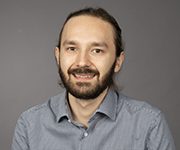AG Mufazalov
Research
We are determined to decipher mechanisms leading to immune dysfunction. In particular, our research focuses on the role of cytokine signaling in autoimmunity, chronic inflammation and maternal immune activation during pregnancy. We are confident that the immune system plays a central role in keeping our physiology in check and the majority of diseases could be treated by restoration of disrupted immune homeostasis. Through our research, we aim to improve existing and develop novel therapeutic strategies To address complex biomedical questions, we utilize preclinical models that are based on genetically modified mice with cell-type-specific gene knockouts and cytokine overexpression. We routinely employ in vivo immunizations, adoptive cell transfers, timed pregnancies, behavioral tests and other protocols. Our standard methods include, but are not limited to, Flow Cytometry, Western Blotting, ELISA, qPCR and primary cell cultures. Our group works in close collaboration with other members of the Institute for Molecular Medicine, especially with the AG Waisman.
To mimic Multiple Sclerosis in a preclinical setting, we use a murine model for CNS-directed autoimmunity, namely Experimental Autoimmune Encephalomyelitis (EAE).
The assessment of disease progression and analysis of CNS infiltrates in interleukin-1 receptor type 1 (IL-1R1) as well as interleukin-1 receptor type 2 (IL-1R2) deficient mice is our toolbox in studying the role of IL-1 in CNS-directed autoimmunity.
Idiopathic Multicentric Castleman Disease (iMCD) is a rare, but devastating, lymphoproliferative disorder. In this disease, IL-6 is considered to be a major pathogenic factor that causes lymphadenopathy, hepatosplenomegaly, thrombocytopenia, plasmacytosis and multiorgan dysfunction. First-line symptomatic treatment largely relies on inhibition of IL-6 signaling, however, up to 70% of patients remain refractory to IL-6 blockade. The progress on the development of alternative therapeutic interventions remains limited due to the absence of suitable preclinical models.
In this project we aim to identify novel molecular targets in iMCD and repurpose drugs, which are already approved for other inflammatory disorders. We are also fascinated by the idea of developing gene-edited adoptive cell transfer therapy for the treatment of iMCD. For that, we use mice with conditional IL-6 overexpression that display key features of iMCD and mice deficient in IL-6 signaling.
Currently, there is no definitive standard-of-care neither for already developed ASD nor for the prevention of ASD development. Progress in the field is prevented by the fact that research and therapeutic interventions during human pregnancy are extremely limited for ethical reasons.
To study the etiology of ASD in response to maternally produced cytokines, we use well-defined transgenic mouse models with IL-6 and IL-17A overexpression during pregnancy. This allows us to characterize long-lasting consequences and decipher mechanisms of prenatal imprinting to IL-6 and IL-17A. We believe that insights from our studies will be used to design novel treatment strategies to prevent the development of ASD.
Publications
Selected publications:
For a full publication list see: Pubmed
Andruszewski D, Uhlfelder DC, Desiato G, Regen T, Schelmbauer C, Blanfeld M, Scherer L, Radyushkin K, Pozzi D, Waisman A and Mufazalov IA#. Embryo-restricted responses to maternal IL- 17A promote neurodevelopmental disorders in mouse offspring. Molecular Psychiatry 2024, Online ahead of print. doi: 10.1038/s41380-024-02772-6. # - corresponding author
Regen T, Isaac S, Amorim A, Núñez NG, Hauptmann J, Shanmugavadivu A, Klein M, Sankowski R, Mufazalov IA, Yogev N, Huppert J, Wanke F, Witting M, Grill A, Gálvez EJC, Nikolaev A, Blanfeld M, Prinz I, Schmitt-Kopplin P, Strowig T, Reinhardt C, Prinz M, Bopp T, Becher B, Ubeda C and Waisman A. IL-17 controls central nervous system autoimmunity through the intestinal microbiome. Science Immunology 2021, 6(56):eaaz6563.
Lee CJ, Mehdizadeh S, Smith J, Young A, Mufazalov IA, Mowery CT, Daud A and Bluestone AJ. Regulatory T cell control of systemic immunity and immunotherapy response in liver metastasis. Science Immunology 2020, 5(52):eaba0759.
Mufazalov IA#, Andruszewski D, Schelmbauer C, Heink S, Blanfeld M, Masri J, Tang Y, Schuler R, Eich C, Wunderlich TF, Karbach SH, Bluestone JA, Korn T and Waisman A. Cutting Edge: IL-6-driven immune dysregulation is strictly dependent on IL-6R α-chain expression. Journal of Immunology 2020, 204(4): 747-751. # - corresponding author
Dmitrieva-Posocco O, Dzutsev A, Posocco DF, Hou V, Yuan W, Thovarai V, Mufazalov IA, Gunzer M, Shilovskiy IP, Khaitov MR, Trinchieri G, Waisman A and Grivennikov SI. Cell-Type-Specific Responses to Interleukin-1 Control Microbial Invasion and Tumor-Elicited Inflammation in Colorectal Cancer. Immunity 2019, 50(1):166-180.e7
Atretkhany KSN*, Mufazalov IA*, Dunst J, Kuchmiy A, Gogoleva VS, Andruszewski D, Drutskaya MS, Faustman DL, Schwabenland M, Prinz M, Kruglov AA, Waisman A and Nedospasov SA. Intrinsic TNFR2 signaling in T regulatory cells provides protection in CNS autoimmunity. Proc Natl Acad Sci USA 2018, 115(51):13051-13056. *co-first authorship
Schlüter T, Schelmbauer C, Karram K and Mufazalov IA#. Regulation of IL-1 signaling by the decoy receptor IL-1R2. Journal of Molecular Medicine 2018, 96(10):983-992 (Review article). # - corresponding author
Mufazalov IA#, Kuschmann J, Andruszewski D, Masri J, Gabriel LA, Adams P, Reissig S, Hövelmeyer N and Waisman A#. Balanced Bcl-3 expression in murine CD4+ T cells is required for generation of encephalitogenic Th17 cells. European Journal of Immunology 2017, 47(8):1335-1341. # - corresponding author
Mufazalov IA#, Schelmbauer C, Regen T, Kuschmann J, Wanke F, Gabriel LA, Hauptmann J, Muller W, Pinteaux E, Kurschus FC and Waisman A#. IL-1 signaling is critical for expansion but not generation of autoreactive GM-CSF+ Th17 cells. The EMBO journal 2017, 36: p102-115. # - corresponding author
Mufazalov IA#, Regen T, Schelmbauer C, Kuschmann J, Muratova AM, Nikolaev A, Muller W, Pinteaux E and Waisman A#. Generation of a Novel T Cell Specific Interleukin-1 Receptor Type 1 Conditional Knock Out Mouse Reveals Intrinsic Defects in Survival, Expansion and Cytokine Production of CD4 T Cells. PLOS One 2016, 11: e0161505. # - corresponding author
Mufazalov IA# and Waisman A. Isolation of Central Nervous System (CNS) infiltrating cells. Methods in Molecular Biology 2016, 1304: p73-79 (Book chapter). # - corresponding author
AG Mufazalov
Alumni
PhD thesis
Carsten Schelmbauer (2018-2023)
Master thesis
Helena Schäfer (2023)
David Andruszewski (2019)
Laureen Gabriel (2015)
Bachelor thesis
Annika Ruckmich (2025, ongoing)
Mia Hüttenschmidt (2025, ongoing)
Mirja Guskowski (2025, ongoing)
Leon Amelong (2024)
Katherine Junger (2023)
David Andruszewski (2018)
Carsten Schelmbauer (2014)
Janina Kuschmann (2012)
Part time technical assistant (HiWi)
Mirja Guskowski (2024, ongoing)
Markus Schraft (2023)
Lena Scherer (2021-2023)
Patricia Winkler (2019-2021)
Internships
Kama Atretkhany, PhD student (2014, 2015, 2018)
Alisa Muratova, PhD student (2016)




